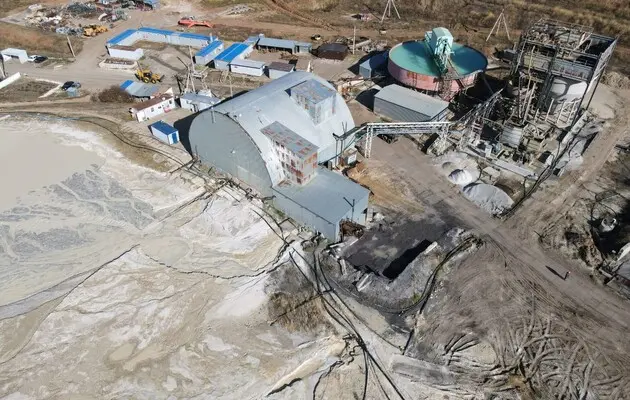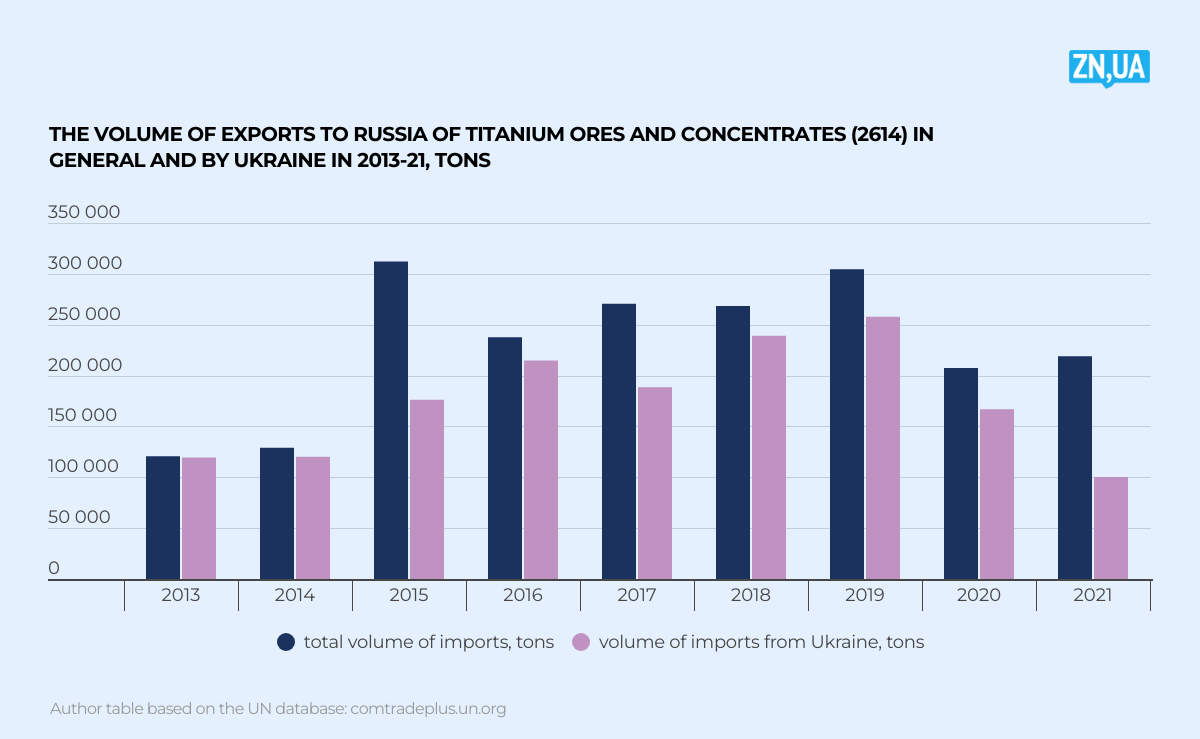Ukraine Risks Being Left Without Strategically Important Titanium Production

The Government of Ukraine has decided to put the joint-stock company "United Mining and Chemical Company" (JSC UMCC) up for sale through an online auction and to include the Demurinskyi Mining and Processing Plant among the objects of large-scale privatization.
We are not opponents of privatization as such and share the opinion that a private owner is more efficient than the state.
Provided, however, that this owner is guided by the laws of economic expediency, and does not act contrary to them, in order to destroy the production over which he will gain control. Such investments are called corrosive. Behind such investments, as a rule, the capital of an aggressive state, which carries out hybrid operations along the economic line with the aim of destroying the economy of the victim country, is hidden.
In other words, corrosive investments are investments in the economy of another country that pursue not economic, but political goals of destroying or subjugating the state chosen by the aggressor. At first glance, the target of corrosive investments is individual enterprises, but in fact, with the set of affected economic objects, individual sectors of the economy are destroyed and/or a political goal is achieved. The real intention of the aggressor becomes clear at the final stage of a specific operation, namely when preventing destructive consequences is difficult, and in certain cases, impossible.
The analysis shows that from 1995 to 2021, of more than 1,500 strategic enterprises of Ukraine, which were transferred for privatization by the decision of the Cabinet of Ministers of Ukraine, about 42% have been liquidated or are at the stage of bankruptcy. The most affected by corrosive investments was the processing industry, namely, they caused about 50% of losses to this industry. In addition, the mining industry and stone quarries were also affected – almost 47% of losses, scientific and technical activities – about 35% of losses.
This article examines the potential danger of another corrosive investment. Any natural or legal person whose characteristics do not contradict the requirements of paragraph 2 of Article 8 of the Law of Ukraine "On the Privatization of State and Communal Property" can participate in the auction announced by the government.
For all the external legal correctness of this approach, it absolutely does not take into account the realities of wartime, the peculiarities and dangers of the consequences of the sale to unknown "formally clean and reliable" structures of deposits of such strategic raw materials as titanium, zirconium and hafnium ores, in the conditions of a long-term war.
The objects put up for privatization are critically needed by the Russian Federation, and for a long time it has been trying to establish control over them.
Having brought to an end the dilapidated and exhausted processing titanium industry of Ukraine, the Russians will deprive us of hope for the post-war development of the titanium industry for years to come. Reconstruction of the titanium industry is an extremely complex and multi-level task, the solution of which depends not only on the economy, but also on the national security of Ukraine and, without exaggeration, to a large extent also of the countries of the West.
Privatization of all powerful state-owned mining enterprises at once contains two strategic threats:
- establishment of control over mining enterprises by the aggressor country;
- deprivation of raw materials from powerful processing industry enterprises that are strategic for the economy of Ukraine.
To begin with, a bit of the base, without understanding which the "titanium tragedy" may undeservedly remain without the attention and reaction of society.
The basis of the metallurgical titanium industry (metallic titanium) is the production of spongy titanium (titanium sponge) — an intermediate product in the process of manufacturing metallic titanium ingots.
This first stage of processing raw materials into titanium metal is a bottleneck in the entire process. The fact is that titanium sponge, without which it is impossible to produce metal titanium, is produced only by seven countries in the world: China (220 thousand tons of sponge titanium per year), the Russian Federation (over 50 thousand tons), Kazakhstan (about 15 thousand tons), Japan (60 thousand tons), Saudi Arabia (owned by a Japanese company, 12 thousand tons), India (300 tons) and Ukraine (project production capacity of 20 thousand tons).
As you can see, of all the producing countries, only Japan and Ukraine are reliable partners of the West. Actually, the Zaporizhzhia Titanium-Magnesium Plant is the only producer of spongy titanium in Europe.
Ukrainian titanium is used in military activities in Russia
During every takeoff of enemy aircraft or missile attack, Russia brings destruction, tragedy, death to our homes, as well as... a Ukrainian titan. That's right, titanium metal, without which there is no the military–industrial complex (MIC), was smelted from Ukrainian raw materials in Russia for decades.
For example, the Kh-101 missile, which hit the Okhmatdyt National Specialized Children's Hospital, up to 70% of the weight (excluding fuel and warhead) was titanium.
Is there a share of Ukrainian raw materials in this metal titanium? The short answer is very likely.
The mass media repeatedly reported that Ukrainian titanium is being sold in the Russian Federation. Officials, instead of providing the public with comprehensive explanations on a specific question, namely, what exactly the Russians make rockets from, resort to vague reflections on the role of ilmenite raw materials in the production of chemical products.
And recently, the main tool has become an answer to any criticism of the authorities and to any question: these are psychological operations of the Russian Federation (PSYOP).
This very behavior of the responsible persons indirectly indicates that the accusations by the journalists are not groundless.
There are other signs that indicate this.
First, Ukraine was the main supplier of titanium raw materials to the Russian Federation.
In 2013, on the eve of the beginning of the Russian aggression, 98.9% of the total Russian import of titanium raw materials was supplied from Ukraine. It should be noted that at that time Russia had no chemical production at all, which would require titanium concentrate. That is, all these raw materials went to the production of metal titanium, and later to the production of aircraft, missiles, ships and other products of the military–industrial complex (MIC).
They did not stop, but, on the contrary, increased in absolute numbers of deliveries even after the start of military aggression. According to the analysis of international open databases, including data from the United Nations (UN), from 2013 to 2021, Ukraine remained the main supplier of titanium raw materials to the Russian Federation. Average annual deliveries from Ukraine during this period amounted to about 80% of the total amount of Russian imports, and in some years, this share exceeded 90%.
That is, supplies of titanium raw materials did not stop during the war, after the temporary occupation of Crimea, and during and after the fierce battles in Donbas.
These supplies did not stop even after the change of power, remaining at the level of about 80% of total Russian imports in 2019–2020. Only in the pre-war year 2021, 100,000 tons of titanium raw materials were delivered to the Russian Federation, which was about 47% of the total volume received by the Russian Federation.
Based on these figures, we can confidently say that the missiles that flew at our heads on February 24, 2022, were made of Ukrainian titanium raw materials.
Secondly, in conditions where direct deliveries to the Russian Federation have become impossible, part of the titanium raw material is supplied not to its consumers, but to intermediaries who have nothing to do with the use of this raw material. We will not give individual examples. There are many of them and they are systemic. It is easy to verify this by examining information from open international databases.
Thirdly, for strange reasons, the existing mechanisms that would effectively counteract the opaque trade in strategic raw materials are not used, in particular the capabilities of the State Export Control Service of Ukraine (SECSU).
Why are representatives of the State Export Control Service of Ukraine silent?
Ukraine's export of rutile concentrates, as well as other components for the production of metal titanium and even finished products from metal titanium, for unknown but strange reasons, is not controlled by the State Export Control Service of Ukraine (SECSU). This creates the prerequisites for providing Russian industry (including the military–industrial complex (MIC)) with quality Ukrainian raw materials and for the development of international criminal mediation schemes for the implementation of these supplies.
It seems incomprehensible and illogical not to extend the procedure for obtaining a permit to the State Export Control Service of Ukraine (SECSU) for the export of the titanium products listed above. Such a procedure obliges the Ukrainian exporter to specify the final recipient of the exported products. The procedure imposes an obligation on the relevant special services to check this final recipient, and also obliges the State Export Control Service of Ukraine (SECSU) to control and record the fact of the delivery of products to the specified consumer.
A strange and illogical situation: ilmenite concentrates, 95% of which are used for bleaching, rubber, paper products and plastic, must go through the permit procedure, while rutile concentrates, like semi-finished products for the production of metal titanium, for some reason do not.
Any attempts to put them under export control are accompanied by statements from certain exporters, entrepreneurs and officials that they are trying to destroy the titanium industry. The false opinion is imposed on society in an unappealable, manipulative and completely false way that it is ilmenite and only ilmenite that should be subject to export control, and the rest of the above has nothing to do with the production of weapons in the Russian Federation.
There are three powerful suppliers of titanium raw materials for export in Ukraine: the State Enterprise "United Mining and Chemical Company", mining and beneficiation plants belonging to the structures of Dmytro Firtash, and Vyrobnycho – Komertsiyna Firma (VKF) "Velta" LLC (more precisely, the "Velta" group of companies) which belongs to Andriy Brodsky.
Under these conditions, is it difficult to find out through whom exactly supplies of strategic raw materials to the aggressor take place, and to stop a business built on blood? No, it is not difficult to do. All that is needed is political will.
The first simple and demonstrative step in this will be to put under export control the entire list of strategic titanium raw materials that can be used for the production of weapons.
Ukraine should not turn into a commodity appendage of the world economy
Today, such a situation has developed in the titanic sector of the economy.
The following are state property:
- the three largest operating enterprises in the mining industry (titanium raw materials);
- strategic enterprises of the processing industry (producer of spongy titanium Zaporizhzhia Titanium-Magnesium Plant, the largest producer of chemical fertilizers and dyes in Ukraine, PJSC "Sumykhimprom", one of the largest producers of zirconium-hafnium products, including for nuclear energy, the State Scientific and Production Enterprise "Zirconium");
- leading specialized scientific institutions.
All prerequisites for the development of vertically integrated industrial production of competitive final products have been created.
This is a long chain of enterprises from various sectors of the economy, and it is based on domestic production of raw materials.
It is the production of final products that brings extremely high profits. Privatization of all the state-owned mining enterprises with which this article began could deal a devastating blow to Ukraine's potentially super-profitable processing industry.
If you take away its raw material base from the state processing industry, the entire industry with incredible scientific and economic potential will simply disappear. Disguised as "market relations", the refusal to supply ore and concentrates from "privatized enterprises" to domestic enterprises can become a real consequence of this privatization.
Its initiators cannot fail to know this.
What else can be done?
In order to prevent potential threats as much as possible, at least the following should be done.
First, to review the expediency of privatization or at least not to put up for sale all strategic deposits of titanium-containing ores and concentrate production.
Secondly, implement and officially enshrine in a law or bylaw of the relevant state authorities the admission of applicants to participate in the auction for the sale of the largest deposits of strategic materials in Ukraine only after careful monitoring by special services (the Foreign Intelligence Service of Ukraine (SZRU), the Security Service of Ukraine (SBU), the Main Directorate of Intelligence of the Ministry of Defence of Ukraine (HUR)) with consideration of this issue at a meeting of the National Security and Defense Council of Ukraine (NSDC).
Thirdly, open information about those who apply for the joint-stock company "United Mining and Chemical Company" (JSC UMCC) and mineral deposits of Ukraine. Society has the right to transparency in the bidding process at which its wealth is sold.
Read this article in Ukrainian and russian.
Please select it with the mouse and press Ctrl+Enter or Submit a bug













 Login with Google
Login with Google